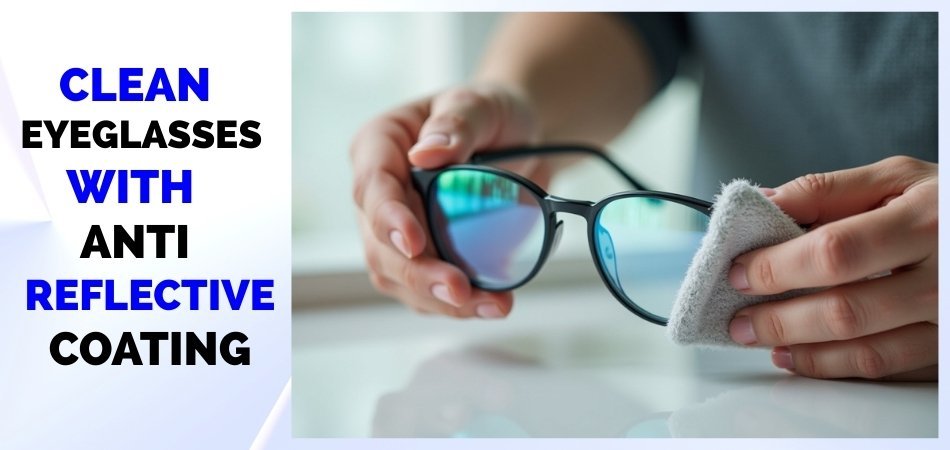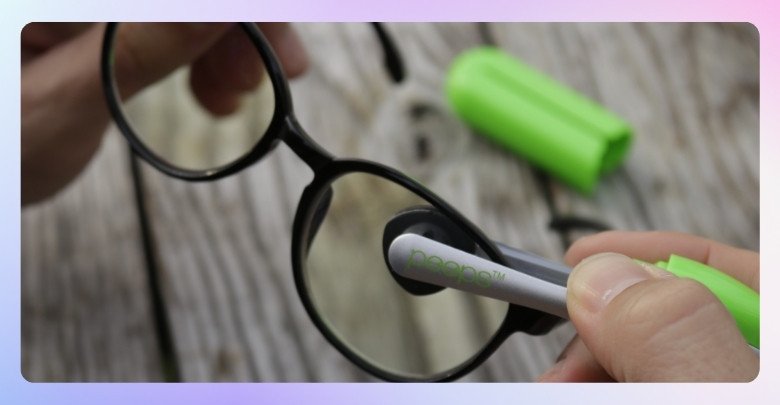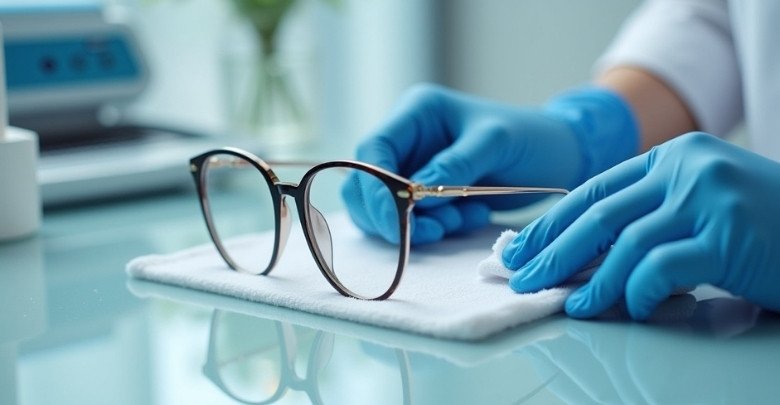Take a moment to imagine that you have spent a long day outdoors, and as you sit down to relax, you notice your eyeglasses are covered in fingerprints and smudges. But these aren’t just any eyeglasses—they have an anti-reflective coating that requires a bit more care. So, how to clean eyeglasses with anti reflective coating without damaging them?
The best way to clean eyeglasses with anti reflective coatings is to rinse them with lukewarm water, put a small drop of mild dish soap on the fingers, rub gently, then rinse thoroughly and dry them with a microfiber cloth. Beware of harsh chemicals, paper towels, and tissues, which can damage the coating.
If you would like to learn more about how you can properly care for your lenses, make sure you keep reading!
How to Clean Eyeglasses With Anti Reflective Coating? Best Practices for Long-Lasting Clarity
Taking care of your eyeglasses with anti-reflective coating can be a bit tricky, but with the right approach, you can keep them clear and streak-free. Cleaning them properly not only preserves their clarity but also protects the coating. Here’s a simple step-by-step process to ensure your glasses remain in top condition.

Step 1: Rinse Your Glasses With Lukewarm Water
Start by rinsing your eyeglasses under lukewarm water to remove any dust, dirt, or debris. This helps prevent scratches while cleaning. Never use hot water, as it may damage the lens coating. A gentle rinse ensures a clean surface before you start wiping.
Step 2: Apply a Small Drop of Mild Dish Soap
Place a tiny drop of mild dish soap on your fingertip. Gently rub the soap on both sides of the lenses with your fingers, being careful not to use too much. Avoid harsh soaps that may contain chemicals that can strip the coating. This step is essential to remove any oils or smudges.
Step 3: Gently Rub the Lenses With Your Fingers
Use your fingers to gently rub the lens surface in small circular motions. The goal is to loosen any oils or dirt, so be gentle to avoid damaging the lens coating. Make sure to clean both the front and back of the lenses. This ensures even cleaning without creating streaks.
Step 4: Rinse Thoroughly with Lukewarm Water
Once you’ve rubbed the lenses, rinse them thoroughly with lukewarm water to remove any soap residue. Leftover soap can cause smudges or streaks once dry, so be sure to rinse well. A good rinse also helps remove any remaining dust particles. Don’t rush this step.
Step 5: Dry with a Microfiber Cloth
After rinsing, gently dry your glasses with a microfiber cloth. Microfiber is ideal because it doesn’t leave lint or scratches. Avoid using tissues, paper towels, or clothes, as they can damage the lens coating. Pat the lenses dry gently, focusing on any areas that might still be damp.
Step 6: Inspect for Any Remaining Smudges
Take a close look at your glasses to see if they have any smudges or streaks. In case of need, repeat the cleaning process, paying particular attention to specific areas. Make sure no spots are left behind that might affect your vision by inspecting them. If these steps don’t work, consider using an advanced cleaning method like peeps by Carbon Klean or seek professional help.
Why Avoid Hot Water When Cleaning Coated Eyeglasses?
When cleaning eyeglasses with special coatings, hot water can do more harm than good. It’s important to know the risks of using hot water to preserve the longevity and effectiveness of your lenses. Here are reasons to avoid it:
- Damages Lens Coating: Hot water can cause the anti-reflective or protective coating to peel or degrade. This leads to blurry, damaged lenses.
- Changes Lens Shape: Extreme heat can distort the frame or lens, leading to improper fit. This may affect your vision and comfort.
- Weakens Adhesive: Eyeglasses are often held together by glue. Hot water can weaken or dissolve the adhesive, causing frame parts to loosen.
- Causes Warping: High temperatures can cause plastic frames to warp or bend. This changes the shape of your glasses, affecting their functionality.
- Creates Streaks: Hot water may leave streaks or residue on the lenses. These can be difficult to remove, leading to a frustrating cleaning process.
- Affects Lens Clarity: Prolonged exposure to hot water can impact the clarity of lenses. It reduces their optical performance, affecting overall vision quality.
- Promotes Bacteria Growth: Hot water can encourage bacteria to multiply on your glasses. This can lead to further smudging or contamination of the lenses.
- Increases Risk of Cracking: Sudden exposure to hot water may cause lenses to crack or develop tiny fractures. These cracks compromise the integrity of your glasses.
How Safe Are Advanced Cleaning Tools Like Peeps for Anti-Reflective Eyeglasses?
Cleaning your eyeglasses with advanced tools like Peeps sounds easy, but you might wonder if it’s safe for your lenses, especially the special anti-reflective coating. Let’s dive into the details to find out:

Gentle Cleaning Method
Advanced cleaning tools like Peeps are designed to be gentle on your eyeglasses. They use carbon microfiber technology, which cleans without harsh rubbing or chemicals. This makes it a safer choice for your lenses compared to other cleaning methods. You can trust that it won’t scratch or damage the anti-reflective coating. So, it’s a good option to keep your glasses safe while cleaning.
Safe for All Lenses
This device is safe to use on all types of lenses, including those with anti-reflective coating. Many people worry about cleaners damaging delicate coatings, but Peeps is specially designed to avoid that. It doesn’t cause any harm to the lens surface or the coating. As long as you follow the instructions and use them properly, your eyeglasses should remain in great condition.
No Chemicals Involved
Traditional cleaning sprays may contain harsh ingredients that could damage the special coating on your glasses. Tools like Peeps and along with lens wipes safe for glasses, use gentle methods without chemicals to protect your lenses. This makes them much safer for daily use. With no harsh ingredients, you can be sure your eyeglasses stay clear and undamaged.
Easy to Use
This tool is very easy to use. You just need to slide it over your lenses in a smooth motion, and it removes smudges and dust. It’s quick and effective without any mess. You won’t need to worry about complicated steps or extra equipment. It’s a simple solution that works every time you clean your glasses.
Long-Lasting Effect
One thing to consider is that Peeps can last for up to 500 uses. This means that you don’t have to keep buying new cleaning cloths or sprays. It’s a cost-effective option in the long run. The carbon microfiber pads inside the tool are durable enough to last through many cleanings. But remember, you may need to replace the pads after several uses to maintain the quality.
Products to Avoid When Cleaning Coated Lenses
Coated lenses can be difficult to care for if you don’t know which products are safe. Some cleaners may look harmless, but they can cause damage. Using the wrong items could scratch, fade, or even ruin your lenses. Read on to learn what to avoid:
Paper Towels and Tissues
Paper towels and tissues might seem soft, but they can be rough on lenses. They often have small fibers that scratch the coating. Over time, these tiny scratches can build up and blur your vision. It’s always better to use a microfiber cloth. This helps keep your lenses clear and damage-free.
Window or Glass Cleaners
It might feel easy to grab a glass cleaner when your lenses get dirty. But many glass cleaners have strong chemicals like ammonia. These chemicals can wear away the protective coating on your lenses. Once the coating is damaged, it can’t be fixed. Stick to lens-safe cleaners made just for eyeglasses.
Household Cleaners
Cleaning sprays used around the house should never touch your eyeglasses. Products like bleach or multi-surface sprays are far too harsh. They can break down the anti-reflective coating quickly. Even one cleaning with these can ruin your lenses. Always choose products made for eyewear care.
Alcohol-Based Cleaners
Some people think rubbing alcohol is a quick fix for dirty lenses. However, alcohol can weaken and strip away lens coatings. It might work once or twice, but it will damage the lenses over time. Plus, it can dry out and crack the coating. Gentle cleaning solutions are a much safer choice.
Rough or Old Clothes
Using an old shirt or rough cloth to wipe lenses is a big mistake. The fabric may have dirt or tiny rough spots that scratch lenses. Even if the cloth feels soft, it can still cause harm. Always use a clean, dry microfiber cloth. It’s designed to clean without scratching.
When Might Alcohol Be Appropriate for Cleaning Antireflective Coated Eyeglasses?
Sometimes, cleaning your antireflective-coated eyeglasses can feel tricky when regular methods do not work well enough. Mild soap and water usually do the job, but stubborn smudges can remain. In certain cases, alcohol might help remove greasy or sticky marks safely. It should only be used when other gentle cleaning methods have already failed.
Before you clean eyeglasses with alcohol, it is important to use the right type of alcohol-based cleaner. Make sure the cleaner contains a low percentage of alcohol and is made for eyeglasses. High alcohol levels can harm the delicate anti-reflective coating very quickly. Always check with your eyeglass provider before trying any alcohol-based cleaning method.
When using alcohol, apply it carefully and only in small amounts to avoid coating damage. Never pour alcohol directly onto the lenses as this can cause streaking or cloudiness. Spray the alcohol-based cleaner lightly onto a microfiber cloth instead. Gently wipe the lenses without pressing too hard to protect the coating.
When to Seek Professional Eyeglass Cleaning Services?
It is important to keep your eyeglasses clean at home, but sometimes simple cleaning is not sufficient to resolve certain issues. Dirt, scratches, and damage can build up without you even noticing it. Knowing when to ask a professional for help can save your glasses. Here is when you should consider it.

Hard-to-Remove Dirt
Sometimes dirt gets stuck in tiny parts of your glasses that are hard to reach. No matter how much you clean, it just stays there. Professionals have special tools to clean those small spaces properly. They can make your glasses feel brand new again without causing any damage.
Scratches on Lenses
Small scratches on your lenses can make it hard to see clearly. Trying to fix scratches at home can actually make them worse. Professional cleaners can polish and treat lenses carefully without harming them. It’s a safer way to fix scratched lenses the right way.
Loose Screws or Parts
If your glasses feel loose or if the screws keep falling out, it’s time to see a professional. Loose parts can cause your glasses to sit wrong on your face. A professional can tighten everything properly without overdoing it. This helps your glasses fit better and last longer.
Bent Frames
Bent frames are not only uncomfortable but also make glasses sit wrong on your face. Trying to bend them back yourself can break them easily. Professionals have the right tools to adjust frames without snapping them. It’s a smart idea to let them handle frame repairs.
Lens Coating Damage
If you see the lens coating peeling, bubbling, or looking strange, it’s a sign of damage. Cleaning it yourself can make the problem worse. Professionals can check the damage and recommend the best solution. Sometimes they can even restore the coating or suggest replacement options.
Regular Maintenance Check
Even if your glasses seem fine, a regular check by a professional is a smart move. They can spot small problems you might miss. This helps prevent bigger issues later on and keeps your glasses in top shape. A quick professional cleaning can also make your lenses clearer and more comfortable.
Frequently Asked Questions
There are many questions that can arise when it comes to cleaning your glasses with anti-reflective coating. You may have questions about the right tools, methods, and even some surprising situations. To help you care for your lenses properly, here are answers to common questions:
How Often Should I Clean My Eyeglasses With Anti-Reflective Coating?
It’s a good idea to clean your eyeglasses with anti-reflective coating regularly, especially if you wear them every day. Ideally, clean them once a day to keep them smudge-free. If they are exposed to dirt, dust, or fingerprints, clean them immediately to avoid buildup. Regular cleaning ensures that the coating stays in good condition and your lenses stay clear.
Can I Use Tap Water to Clean My Eyeglasses?
While tap water may seem like a quick fix, it can contain minerals that leave behind spots or residues. Always use lukewarm water instead of tap water, as it helps rinse off dust and debris without leaving streaks. Tap water, especially if it’s hard, could cause mineral deposits that can damage your anti-reflective coating over time. It’s better to be cautious and use clean, lukewarm water.
How Do I Know If My Lenses Have Anti-Reflective Coating?
You can tell if your lenses have anti-reflective coating by looking at them in bright light. If they appear almost clear or have a slight greenish or bluish tint, they likely have the coating. You might also notice that reflections are much less noticeable than with regular lenses. If you’re still unsure, ask your optician or check with the manufacturer.
Is It Safe to Use Cleaning Wipes on Coated Lenses?
Many lens wipes are safe for anti-reflective lenses, but you should always make sure they’re designed for coated lenses. Avoid wipes with alcohol or other harsh chemicals, as they can damage the coating. Always check the label to ensure they are suitable for your glasses. If in doubt, using a microfiber cloth with water or a lens cleaner made specifically for coated lenses is safer.
Can I Use a Toothbrush to Clean My Lenses?
Using a toothbrush to clean your eyeglasses is not recommended, especially for lenses with an anti-reflective coating. The bristles can scratch the lens surface, causing long-term damage. Instead, gently rub the lenses with your fingers using mild soap and water. Always use a microfiber cloth to dry the lenses.
How Do I Avoid Scratching My Lenses While Cleaning?
To avoid scratching your lenses, never use rough materials like paper towels, tissues, or old clothing. Always use a clean microfiber cloth that is designed to safely clean eyeglasses. Before cleaning, rinse your lenses with lukewarm water to remove dust or dirt that can scratch the surface. Also, avoid using excessive pressure when cleaning.
Can I Use My Shirt to Wipe My Lenses?
It’s not a good idea to use your shirt or any fabric that isn’t designed for cleaning lenses. Shirts often carry dirt, oils, and rough textures that can scratch the lens coating. A microfiber cloth is the safest choice for cleaning your lenses. Always keep a clean cloth on hand for when you need it.
Bottom Line
After a long day, nothing feels better than clear, comfortable vision through spotless lenses. Taking just a few extra minutes to care for your glasses can make a huge difference. When you know how to clean eyeglasses with anti reflective coating properly, you protect both your vision and your investment.
Simple steps like rinsing with lukewarm water, using mild dish soap, and drying with a microfiber cloth keep your lenses in top shape. Avoid harsh chemicals, rough cloths, and hot water to prevent damage to the delicate coating. And when regular cleaning isn’t enough, advanced tools or professional help can save the day.
Your eyeglasses do more than just correct your vision—they support your daily life. Keep them clear and cared for by following these easy tips. This will be good for your eyes!






